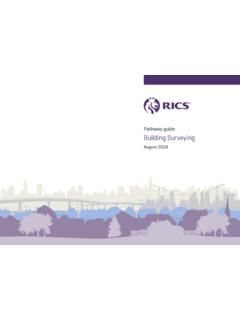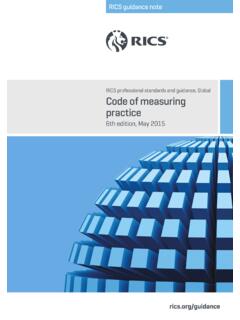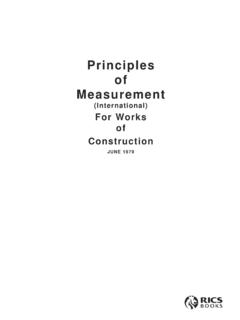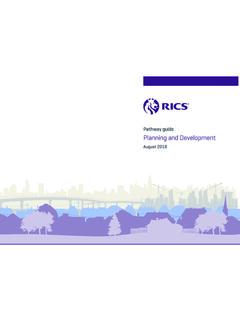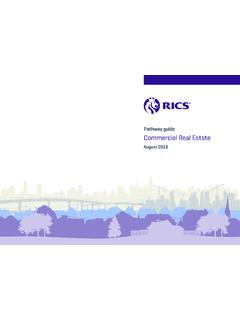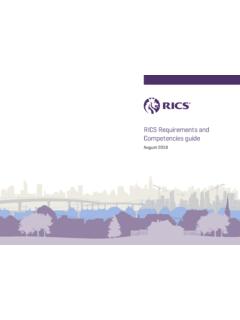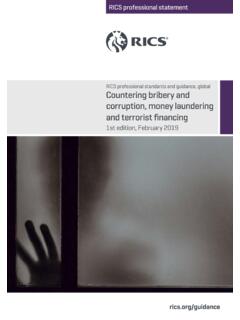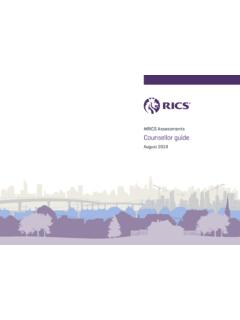Transcription of Retrofitting to decarbonise UK existing housing stock - RICS
1 Retrofitting to decarbonise UK existing housing stock RICS net zero policy position paper RICS net zero policy position paper Contents Executive Sector Emissions Policy Energy Efficiency 10. Energy Performance 12. Embodied Carbon .. 15. Industry Standards .. 15. Industry Specifications .. 16. Drivers to Retrofitting Homes ..17. Taxation 19. Variable Stamp 19. Reduction on VAT for Home 20. Green 21. 23. 2. Foreword Achieving net zero carbon by 2050 is undoubtfully one of the greatest ambitions set by the UK Government in the drive to tackle climate change. While there are significant challenges across the built and natural environment to decarbonise , there are opportunities for industry and Government to work together, raising the bar of sustainability Dr Patrice Cairns MEng through standards, practice and effective policy. UK Policy Manager As a trusted professional body enforcing standards across the built and natural environment, we have an important role to play in shaping a more sustainable world.
2 In response RICS are driving standards and developing tools across the sector, from low carbon and resilient infrastructure and built assets, to climate adaptative solutions through land management and green finance. While we have made progress, there is much to do, and we aim to play a leadership role in embedding sustainable business practice and implementing the UN's sustainable development goals (SDG's) within the surveying profession. Through our Value the Planet campaign we will support the built and natural environment sector in delivering lasting benefits to our planet, people, communities and markets. The built environment sector contributes significantly to national energy use and carbon emissions, yet progress in the decarbonisation of buildings has been limited and the Hew Edgar MCIPR challenge going forward even greater. Given that new housing accounts for 1-2% of total Head of UK Government Relations and City Strategy building stock each year, addressing the energy efficiency of the UK's existing housing stock is one of the most cost -effective and crucial routes to achieving net zero ambitions.
3 Retrofitting provides an opportunity to achieve both operational carbon and significant embodied carbon savings through re-use rather than re-build. While the UK Government ambitions in decarbonising housing stock have been stated, the policy route is uncertain. A holistic approach to Retrofitting is required, reviewing the existing myriad of Government policies and schemes that seek to address specific energy efficiency issues, and identifying both policy gaps and opportunities to enhance outcomes. This policy paper seeks to review the existing policy landscape across Retrofitting and identify the opportunities that Government can take with industry expertise to boost energy efficiency through a package of regulatory measures, industry standards, fiscal levers and market insight. Retrofitting of existing homes requires a significant step change to accelerate pace, driving not only a reduction in carbon emissions, but positive social benefits through enhancing wellbeing and skilled job creation.
4 However the task is formidable, and the UK will need to take immediate action to close the widening gap. 3. RICS net zero policy position paper Executive Summary An overhaul to the energy performance of the UK's existing housing stock is a vital milestone on the Governments net zero pathway, both in operational and embodied carbon savings. While decarbonisation of the heat network ultimately remains one the toughest challenges, an energy efficient building fabric is needed to be both effective in cost savings and emissions reductions. The pace of Retrofitting homes is lagging. The barriers to scaling up the uptake of energy efficient measures in domestic housing have been well documented by existing literature, and are reviewed within this paper, with the main barriers continuing to be an obstacle across the fields of regulation, finance, data, sector capacity and consumer drive. Underpinning these barriers is the lack of a Government policy roadmap providing clarity and certainty on the route to a net zero 2050.
5 This policy focused paper explores the current landscape of Retrofitting policy drivers, regulations, technical processes and fiscal levers, identifying both gaps and opportunities, and aims to identify where industry standards and tools can overcome barriers and enhance the value of Retrofitting in both achieving Government targets and in encouraging consumers to invest in their property. The surveying profession is key to delivering fit for purpose Retrofitting of homes, from undertaking property assessments and data management, to making project decisions that can maximise carbon savings. RICS is developing standards and practical tools that will enhance transparency and reduce risk, thereby increasing investment in carbon mitigation measures of buildings. 4. Recommendations Strategic Government have focused primarily on addressing low carbon new build, but must now prioritise cost -effective policy development to deliver decarbonisation of the UK's existing housing stock as a critical milestone on the net zero path to 2050.
6 Government must not delay in making strategic climate change policy decisions relating to the UK's existing housing stock , must commit to sustained funding and a package of financial incentive mechanisms for Retrofitting , drive standards and regulation, and must support industry in delivering the robust pipeline of skills required to undertake this challenge. Government should designate the energy efficiency of the UK's building stock a national infrastructure priority, with appropriate long-term investment and bring in line with the National Infrastructure Commission portfolio. Government must publish a policy roadmap for delivery of decarbonised homes, align its suite of climate, energy and fuel poverty policies, and review/assess the impacts of existing polices on reaching the net zero targets. Government must demonstrate support, incentives and financial packages for both low-income and vulnerable households, and the able to pay' market.
7 Regulatory Government must work closely with sector stakeholders and publish a defined road map, with quantitative targets, investment and implementation plans to achieve ambitions of a minimum EPC rating C' existing housing stock . Government should monitor and ensure that Local Authorities are adequately resourced to manage and enforce across their portfolio of building control, minimum energy efficiency standards and EPC's. Government should consider reviewing the impact of a minimum MEES at point of sale in the regulatory ambition and transition to bring all dwellings to a EPC rating of C by 2035. Government should provide support to bring heritage buildings up to MEES requirements through financial incentives, and support industry in addressing the skills gaps in Retrofitting heritage buildings. Data Government should take forward the Every Home Counts' recommendation to create a data warehouse, and continue its steps in making EPC data more widely available.
8 While ensuring that safeguards are in place to protect consumer privacy. Government should adopt a more holistic approach to assessing the performance of a building , by continuing its review of EPC's, considering benefits of operational performance systems such as the Australian NABERS, and monitoring the evolvement and outputs of the EU building Passport framework. RICS recommend that Government work in partnership with industry to explore the use of PropTech and data standards to address areas around data governance and privacy protection. Government should further review the limitations of the SAP methodology, and consider the use of smart meter data to improve accuracy and reliability of EPCs, which would allow for more evidenced based building energy efficiency polices/targets. To fully exploit the value of property-based data in helping achieve Government ambitions, RICS recommend that Government support industry in the growth and regulation of the PropTech sector, investing in a robust professional skills pipeline and adopting data standards.
9 5. RICS net zero policy position paper Skills Government should support industry in addressing the skills gap by mandating that all construction and built environment related Apprenticeships and T-levels assess the apprentices understanding of sustainability and mitigation of environmental impact. RICS recommend that all construction and built environment related Apprenticeships and T-levels embrace the knowledge of professional bodies and where possible lead directly to professional body membership. Government must engage with industry to improve public awareness of standards and professional competency-based advice and training in regard to energy efficiency retrofits and wider home improvement works, especially for heritage buildings which are more complex and present a skills gap in the market. Standards and Tools Government should adopt ICMS (2nd edition) as a global benchmarking tool to monitor performance and deliver a net zero carbon built environment by 2050.
10 Government should consider the need to address the embodied carbon attributable to built assets and undertake a review to introduce a regulatory measure, through a route such as building Regulations and in line with RICS Whole Life Carbon Assessment for the Built Environment. RICS recommends that Government promote and utilise the RICS building Carbon Database as a tool in estimating and benchmarking whole life carbon emissions across the public project portfolio. Government should promote industry adoption of the RICS Red Book and other relevant RICS standards such as the Home Survey Standard, each of which ensures that sustainability issues, including energy efficiency ratings, are considered by qualified professionals when reporting valuation and in building surveys. Fiscal RICS recommends the UK Government provide a funding mechanism to encourage owner investment in existing property; for example, Help to Improve and Home Improvement ISA's.
